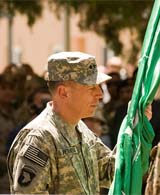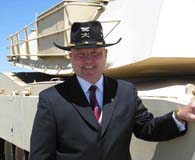Unity of Effort Afghanistan
 For if the trumpet give an uncertain sound, who shall prepare himself for battle? Many trumpets were sounded on July 4, 2010, as America celebrated its 234th Independence Day and, far off on the other side of the world, General David H. Petraeus took command of the Afghanistan War. After nine years of fighting, Petraeus announced that the objective of the war in Afghanistan is to win. He said that the United States, ISAF (International Security Assistance Force) and the Islamic Republic of Afghanistan are committed to a sustained effort. Upon assuming command, Petraeus said: To our Afghan partners: we will do all that we can to help you build a country free of the fear of the Taliban and al-Qaeda, a country in which all citizens can live in peace with one another and provide for themselves and their families.”
For if the trumpet give an uncertain sound, who shall prepare himself for battle? Many trumpets were sounded on July 4, 2010, as America celebrated its 234th Independence Day and, far off on the other side of the world, General David H. Petraeus took command of the Afghanistan War. After nine years of fighting, Petraeus announced that the objective of the war in Afghanistan is to win. He said that the United States, ISAF (International Security Assistance Force) and the Islamic Republic of Afghanistan are committed to a sustained effort. Upon assuming command, Petraeus said: To our Afghan partners: we will do all that we can to help you build a country free of the fear of the Taliban and al-Qaeda, a country in which all citizens can live in peace with one another and provide for themselves and their families.”
Changing top generals at a critical moment in the Afghanistan war is not a good sign. Only eleven days before Petraeus took command, the previous commander, General Stanley McChrystal, was embroiled in a controversy over comments made in a Rolling Stone article that insinuated he and his command were at odds with the Obama administration. As a result, what al Qaeda and the Taliban could not do, Rolling Stone did by “taking out” the top commander in Afghanistan. McChrystal was quoted in the Rolling Stone article as saying he was "betrayed" by Ambassador Karl Eikenberry, his diplomatic partner in Afghanistan. The article implied that McChrystal was as odds with Eikenberry for raising doubts about the possibilities of success in Afghanistan and the reliability of Afghan President Hamid Karzai. "Here’s one that covers his flank for the history books," Rolling Stone reported McChrystal of saying about Eikenberry. "Now, if we fail, they can say ‘I told you so.’"
{default}The fact that a reporter from Rolling Stone could write a sensational trash-talk story and bring down General McChrystal, one of America’s most talented and dedicated counter-terrorism and counterinsurgency warriors, obfuscates the real problem: America’s effort in Afghanistan is suffering from a lack of unity of effort. To many in the United States, it appears that the military is committed to win and the politicians are committed to politics.
In 2009, McChrystal, a veteran special forces commander, was handpicked by the Obama administration to run the “war of necessity” in Afghanistan. Over the past year, the growing rift between the Obama administration and McChrystal over the execution of the war effort in Afghanistan became more visible. As the military-to-civilian cooperation deteriorated more stories popped up in the news media concerning the lack of unity of effort. It only took one sensational article to detonate this rift.
The most dramatic effect of McChrystal’s dismissal will be on the conduct of the counterinsurgency effort in the field. Afghans are naturally suspicious of strangers and McChrystal, charged with the strategic leadership of the war, had worked tirelessly to immerse himself in the human element. In the past year, McChrystal met with hundreds of the Afghan leaders, from the provinces to tribal villages. Earning the loyalty of these people is essential to winning a counterinsurgency campaign in Afghanistan and McChrystal was the face of our resolve during the current surge of forces. McChrystal’s replacement, General Petraeus will require time to gain the trust of the Afghans. Petraeus is a very quick learner and has made many trips to Afghanistan as the CENTCOM Commander. As a minimum, the change of leadership has caused the American-NATO-Afghan effort some vital months at a decisive moment in the surge.
 U.S. troops make up the majority of international forces in Afghanistan with 150,000 “boots on the ground” scheduled by August 2010. This success of this great commitment, however, boils down to one critical issue: will the United States stay with Afghanistan to win the war or depart on an arbitrary timetable. President Obama has not made this clear. As Obama’s closest advisor, David Axlerod said in a June 13, 2010 Meet the Press interview: “… the president made it clear that we can’t make an open-ended commitment there, that the Afghan government and the Afghan people have to take responsibility themselves, and their army, their security. And their civil institutions have to take responsibility. We – he is committed to begin that process of withdrawal in July of, of next year, and that is – continues to be the plan, and we’re going to pursue that on that schedule.”
U.S. troops make up the majority of international forces in Afghanistan with 150,000 “boots on the ground” scheduled by August 2010. This success of this great commitment, however, boils down to one critical issue: will the United States stay with Afghanistan to win the war or depart on an arbitrary timetable. President Obama has not made this clear. As Obama’s closest advisor, David Axlerod said in a June 13, 2010 Meet the Press interview: “… the president made it clear that we can’t make an open-ended commitment there, that the Afghan government and the Afghan people have to take responsibility themselves, and their army, their security. And their civil institutions have to take responsibility. We – he is committed to begin that process of withdrawal in July of, of next year, and that is – continues to be the plan, and we’re going to pursue that on that schedule.”
Axelrod states that the U.S. will begin withdrawing in July 2011 and Petraeus talks about a sustained effort. It seems clear that the “unity of effort” problem has yet to be solved. Some leaders in the U.S. sense this and want to bolster General Petraeus. Senator John McCain, Obama’s opponent in the 2008 Presidential election, hinted that Eikenberry’s role as Ambassador should be reconsidered. At the Senate confirmation hearing for Petraeus, McCain said: "We still have concerns about the civilians side. In fact, I might suggest that consideration be given to reuniting the Crocker/Petraeus team [that served in Iraq]," suggesting that the close cooperation between the Afghanistan commander and the Ambassador was as vital now as it was during the surge in Iraq.
“What I worry about more than anything else is the July of 2011 firm date which the president has not certainly – has not been positive as far as our commitment is concerned,” announced Senator John McCain the day Petraeus took command of the Afghan War. “In other words we need a conditions-based situation, not a date for withdrawal.” McCain called the Obama’s message to begin the withdrawal in July 2011 as “indecipherable and certainly sounds an uncertain trumpet … to our friends as well as our enemies in Afghanistan as to the depths of our commitment.”
The last thing that General Petraeus needs is an uncertain call to arms. He needs the Afghans committed and focused to the fight. He knows that he cannot win the counterinsurgency fight without strong Afghan support. Petraeus also knows that the US military-civilian team must be unified. "This endeavor has to be a team effort,” Petraeus explained in a letter he sent to his troops upon taking command. “We must strive to contribute to the ‘Team of Teams’ at work in Afghanistan and to achieve unity of effort with our diplomatic, international civilian and Afghan partners as we carry out a comprehensive, civil-military counterinsurgency campaign… Cooperation is not optional."
 General Petraeus has daunting challenges ahead and time is fleeting. In the ninth year of conflict, the war in Afghanistan is not close to a successful conclusion and the war cannot be waged forever. Petraeus is keenly aware of this. He has worked miracles before in Iraq, and in war, leadership is everything. I know Petraeus personally, having worked him closely with for nearly two years in the Pentagon, and can report that his leadership is of the highest order. He will work tirelessly to create a unified team and his team will sound a “certain trumpet” to win in Afghanistan. The critical question is whether Petraeus will receive the support he needs from an ambivalent and defensive administration. For if the trumpet give an uncertain sound, who shall prepare himself for battle?
General Petraeus has daunting challenges ahead and time is fleeting. In the ninth year of conflict, the war in Afghanistan is not close to a successful conclusion and the war cannot be waged forever. Petraeus is keenly aware of this. He has worked miracles before in Iraq, and in war, leadership is everything. I know Petraeus personally, having worked him closely with for nearly two years in the Pentagon, and can report that his leadership is of the highest order. He will work tirelessly to create a unified team and his team will sound a “certain trumpet” to win in Afghanistan. The critical question is whether Petraeus will receive the support he needs from an ambivalent and defensive administration. For if the trumpet give an uncertain sound, who shall prepare himself for battle?
John Antal served 30 years in the US Army and served as the Special Assistant to the Chairman of the Joint Chiefs of Staff with David Petraeus in 1998-2000.
ACG thanks Colonel Antal for donating his author’s fee for this article to the Wounded Warrior Project. We encourage readers to donate to this worthy effort to support our nation’s wounded warriors. Visit woundedwarriorproject.org to make a very welcome tax-deductible donation.


A large part of the problem comes from 7 years of wasting blood & treasure on a side-show for the benefit of oil companies & other multi-national mercenaries. It also appears that the current administration has yet to learn what their predecessors never did: democracy can’t be imposed at gunpoint, from the top down. It must be built from the bottom up and this can only be done by a democratic society. Iraq & Afghanistan are tribal societies (like the American First Peoples.) If you do things backwards, you’ll end up with the opposite of the result you want (in these cases, corrupt central governments with no credibility,)